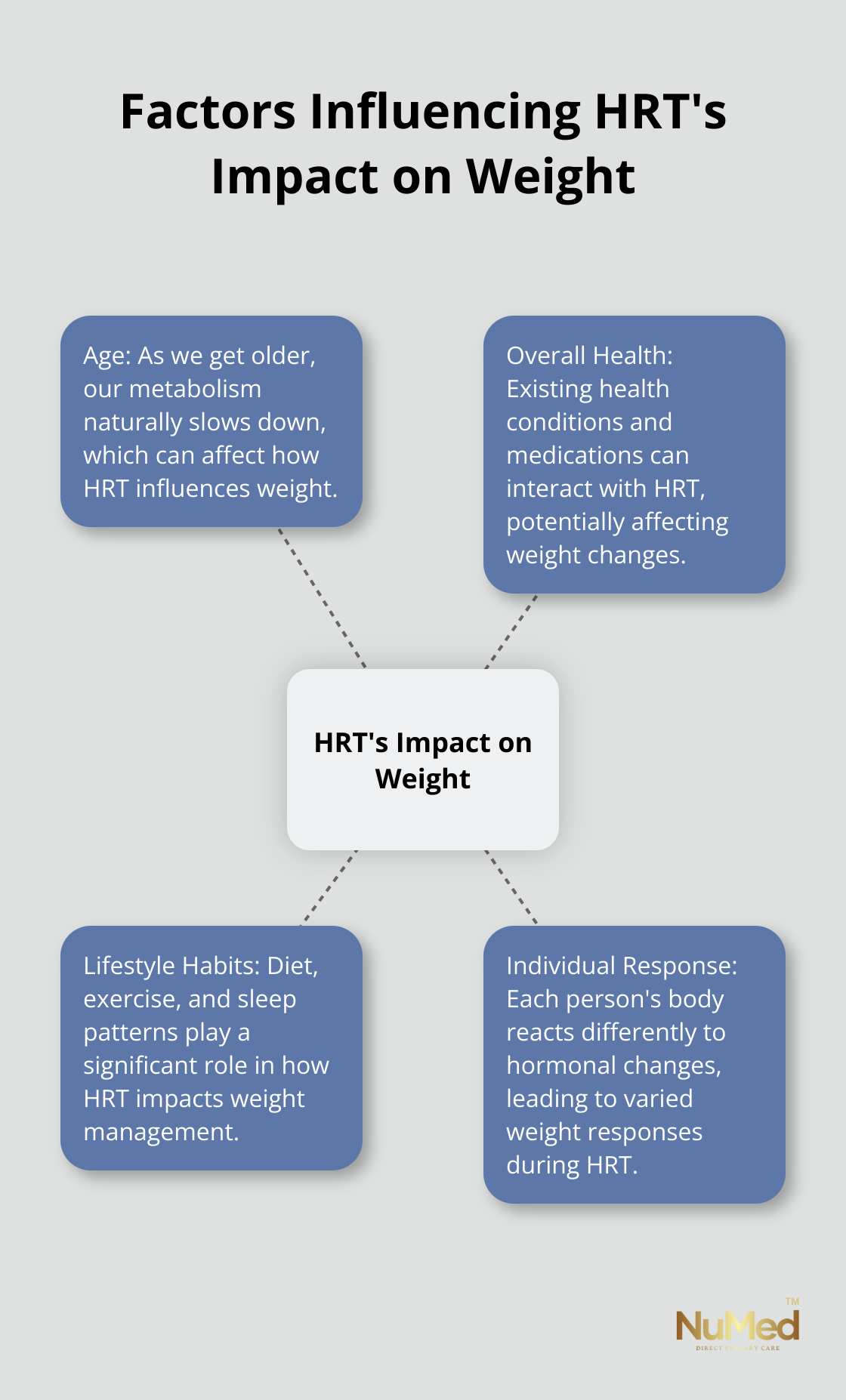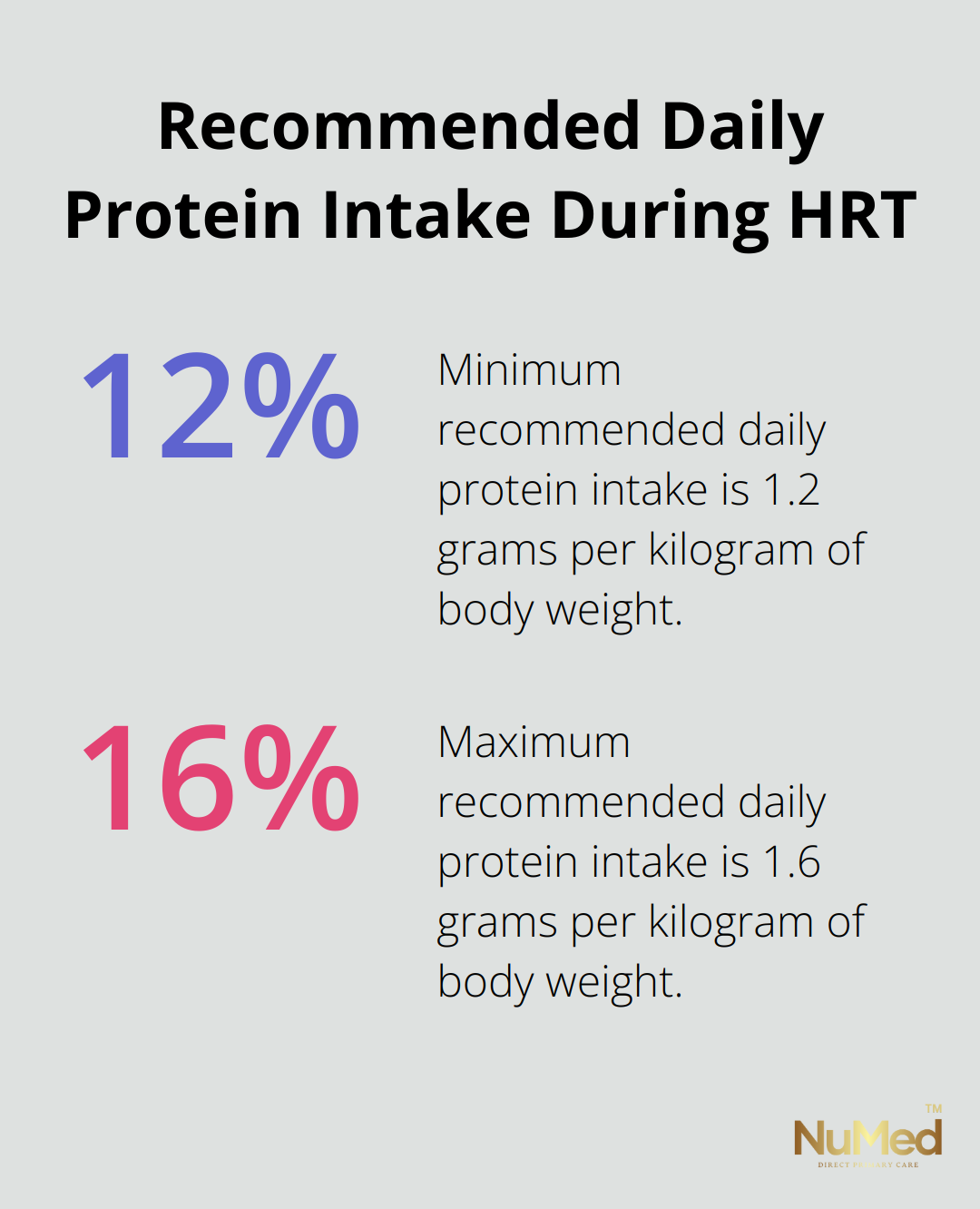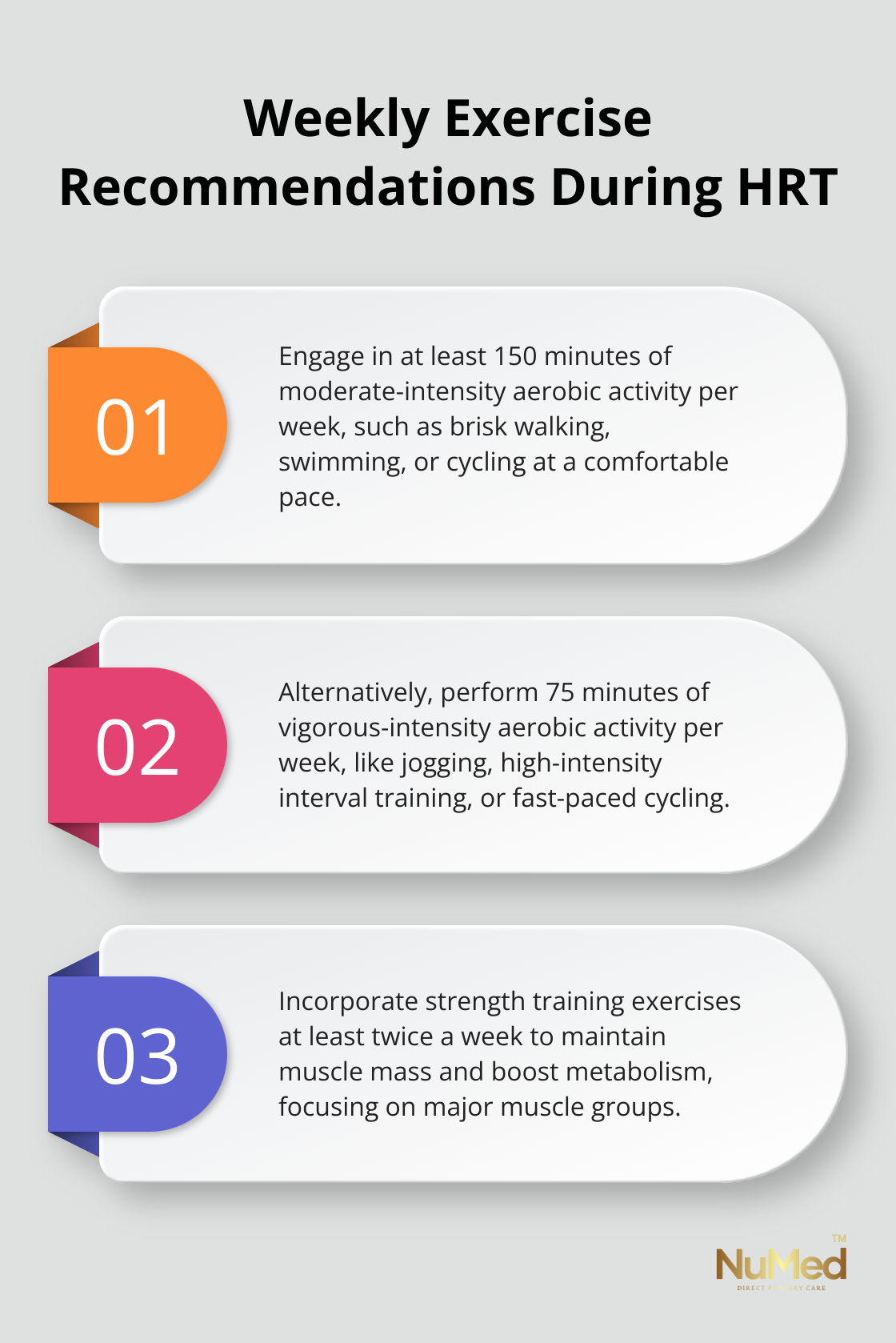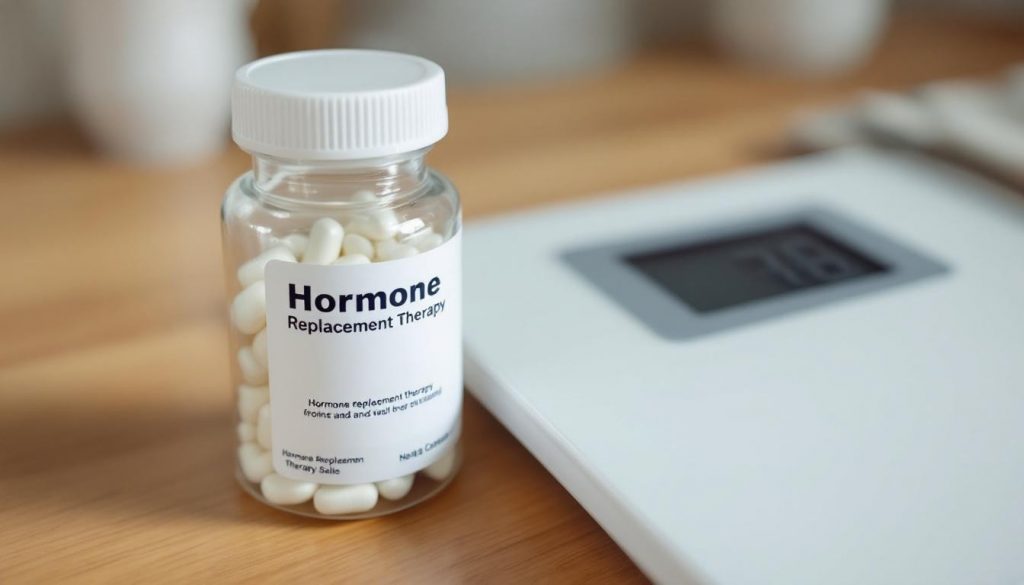At NuMed DPC, we often hear the question: “Will hormone replacement therapy cause weight gain?” The truth is, weight changes during HRT can vary from person to person.
While some individuals may experience fluctuations on the scale, there are effective strategies to manage your weight throughout treatment. In this post, we’ll explore practical tips for maintaining a healthy weight during hormone replacement therapy, focusing on nutrition, exercise, and lifestyle adjustments.
How Does HRT Affect Weight?
The Estrogen-Weight Connection
Hormone replacement therapy (HRT) influences weight through various mechanisms, but it doesn’t directly cause weight gain. Estrogen plays a vital role in metabolism and fat distribution. As estrogen levels drop during menopause, many women experience a metabolic slowdown. HRT restores estrogen levels, which may counteract this metabolic dip.
Fluid Retention and Muscle Preservation
Some women notice initial weight fluctuations due to fluid retention when they start HRT. This effect typically resolves within a few weeks. On a positive note, estrogen therapy helps preserve muscle mass, which is essential for maintaining a healthy metabolism as we age.
Energy and Appetite Regulation
HRT often boosts energy levels and mood, which indirectly supports weight management. Many patients report increased motivation to exercise and make healthier food choices after starting treatment. Some forms of HRT also help regulate appetite, making it easier to maintain a balanced diet.
Individual Responses
It’s crucial to understand that HRT affects each person differently. Factors such as age, overall health, and lifestyle habits all influence how HRT impacts weight. Regular monitoring and open communication with a healthcare provider are essential for managing potential weight changes during treatment.

Metabolic Benefits
Research indicates that HRT can offer metabolic benefits beyond weight management. It may improve insulin sensitivity and reduce the risk of type 2 diabetes in postmenopausal women.
As we explore the relationship between HRT and weight, it’s important to consider the role of diet in managing hormonal changes. Let’s examine effective dietary strategies that complement HRT and support overall health.
Eating for Hormonal Balance
Nutrition plays a pivotal role in managing weight during hormone replacement therapy (HRT). A well-balanced diet supports hormonal balance and helps maintain a healthy weight. Let’s explore effective dietary strategies that complement HRT and support overall health.
Protein and Fiber: Your Weight Management Allies
Hormone replacement therapy replenishes women with ovarian hormones diminished during the natural menopausal transition to alleviate associated symptoms. Try to consume 1.2 to 1.6 grams of protein per kilogram of body weight daily. Good sources include lean meats, fish, eggs, legumes, and dairy products. Fiber-rich foods (vegetables, fruits, and whole grains) regulate blood sugar levels and promote satiety, making weight management easier.

The Power of Healthy Fats
Not all fats hinder weight management. Omega-3 fatty acids, found in fatty fish, flaxseeds, and walnuts, can reduce inflammation and support hormonal balance. Include moderate amounts of healthy fats (avocados, olive oil, and nuts) in your diet to feel satisfied and curb cravings.
Processed Foods and Added Sugars: The Hidden Culprits
Processed foods and added sugars can disrupt your hormones and complicate weight management. HRT has shown potential in improving glycemic control and insulin sensitivity in postmenopausal women, with or without T2DM, and may delay diabetes onset. Choose whole, unprocessed foods and natural sweeteners (like fruit) to satisfy your sweet tooth.
Mindful Eating and Portion Control
Mindful eating helps you tune into your body’s hunger and fullness cues. Use smaller plates, chew slowly, and savor each bite. The American Journal of Clinical Nutrition reports that eating slowly can increase feelings of fullness and reduce calorie intake by up to 10%.
Meal planning is another effective strategy for portion control. Prepare balanced meals in advance, incorporating a variety of colorful vegetables, lean proteins, and whole grains. This approach ensures you’re getting a wide range of nutrients and helps prevent impulsive food choices.
There’s no one-size-fits-all approach to nutrition during HRT. What works for one person may not work for another. Listen to your body and work closely with your healthcare provider to develop a personalized nutrition plan that supports your hormonal health and weight management goals.
Now that we’ve covered the importance of nutrition in managing weight during HRT, let’s explore how physical activity can further enhance your hormone balance and overall well-being.
How Exercise Enhances HRT Results
Exercise plays a pivotal role in managing weight and maximizing the benefits of hormone replacement therapy (HRT). Regular physical activity can amplify the effectiveness of HRT and improve overall well-being.
Strength Training: A Powerful Ally
Strength training offers particular benefits during HRT. It helps preserve muscle mass, which naturally decreases with age and hormonal changes. Recent research suggests a strength training routine designed to be followed four to six days a week, emphasizing both heavy and light-intensity exercises. Compound movements like squats, deadlifts, and push-ups engage multiple muscle groups simultaneously.
A study in the Journal of Clinical Endocrinology & Metabolism revealed that postmenopausal women who performed resistance training twice a week for a year increased their lean body mass by 1.4% and reduced body fat by 3.4%. This improvement in body composition can significantly boost metabolism and support weight management.
Cardiovascular Exercise: Heart Health and More
Aerobic activities such as brisk walking, cycling, or swimming benefit cardiovascular health and weight management during HRT. The American Heart Association recommends at least 150 minutes of moderate-intensity aerobic activity (or 75 minutes of vigorous-intensity aerobic activity) per week.
Recent studies acknowledge that exercise can help prevent postmenopausal symptoms. This demonstrates how exercise can work synergistically with HRT to alleviate menopausal symptoms.

Flexibility and Balance: Essential Components
Flexibility and balance exercises deserve attention. Yoga and Pilates can improve posture, reduce back pain, and enhance overall body awareness. Research in the Journal of Physical Therapy Science found that menopausal women who practiced yoga three times a week for 12 weeks showed significant improvements in balance and flexibility.
Building a Sustainable Routine
Consistency is key to reaping the benefits of exercise during HRT. Start with manageable goals and gradually increase intensity and duration. For example, begin with 10-minute walks three times a week and progress to 30-minute sessions five times a week.
Consider working with a certified fitness professional who understands the unique needs of individuals undergoing HRT. They can design a personalized program that addresses your specific goals and any limitations you may have.
Listen to your body and adjust your routine as needed. Some days might call for a high-intensity workout, while others might benefit from a gentle yoga session. The goal is to make fitness more enjoyable and a regular part of your lifestyle.
Final Thoughts
Hormone replacement therapy does not directly cause weight gain, but it can influence your body’s metabolism and composition. You can effectively manage your weight while benefiting from HRT through strategic dietary choices and regular exercise. Every individual’s experience with HRT is unique, so it’s important to work closely with a healthcare professional who can tailor your treatment plan to your specific needs and goals.
A healthy lifestyle during HRT enhances your overall quality of life, not just manages weight. Nutrient-dense foods, physical activity, and stress management techniques can mitigate menopause symptoms, improve energy levels, and boost your mood. Weight management is a process that requires patience and self-kindness, with small, consistent steps leading to significant improvements over time.
At NuMed Direct Primary Care, we offer comprehensive support for hormone replacement therapy and weight management. Our team provides personalized care that addresses the root causes of health issues, including those related to hormonal changes. We strive to help you achieve optimal health outcomes through our extensive lab services and functional medicine approaches.
















